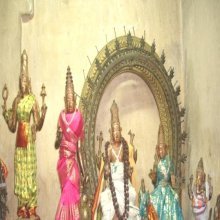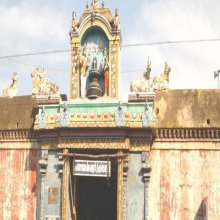Utsava: 22 definitions
Introduction:
Utsava means something in Hinduism, Sanskrit, the history of ancient India, Marathi, Hindi. If you want to know the exact meaning, history, etymology or English translation of this term then check out the descriptions on this page. Add your comment or reference to a book if you want to contribute to this summary article.
Alternative spellings of this word include Utsav.
Images (photo gallery)
(+6 more images available)
In Hinduism
Purana and Itihasa (epic history)
Source: archive.org: Puranic EncyclopediaUtsava (उत्सव).—Celebrations conducted in temples from olden days. There are Śāstraic (scriptural) injunctions as regards conducting utsavas. Utsava is an indispensable celebration when once the deity (idol) is installed in the temple. Utsava should be celebrated for one day, three days or seven days in the very same month in which the deity was installed, because noncelebration of Utsava will render the installation ineffective. Utsava should be conducted either during Uttarāyaṇa (movement of the sun from south to North) or Viṣu (when the Sun is in the centre) or at a time suitable to the temple authorities who conduct the utsava in Śayana, Upavana or Gṛha. It should commence with auspicious ceremonies like the sowing of seeds of nine varieties of foodgrains, and with dance, song, instrumental music etc.
Source: archive.org: Nilamata Purana: a cultural and literary studyUtsava (उत्सव) refers to certain “religious practices” once prevalent in ancient Kashmir (Kaśmīra) as mentioned in the Nīlamatapurāṇa.—The term utsava stands for any festival celebrated in honour of a deity or season, or to commemorate some important event.

The Purana (पुराण, purāṇas) refers to Sanskrit literature preserving ancient India’s vast cultural history, including historical legends, religious ceremonies, various arts and sciences. The eighteen mahapuranas total over 400,000 shlokas (metrical couplets) and date to at least several centuries BCE.
Shaivism (Shaiva philosophy)
Source: Shodhganga: Temple management in the ĀgamasUtsava (उत्सव) refers to “the special occasions from the lord emanates from the garbhagṛha and bestows his grace freely.”.—Utsava has ritual significance beyond the daily pūjā: “During utsavas some special kriyās are performed that are not performed in everyday rituals in the temple. [...] The Kumāratantra declares that utsava bestows both material enjoyments and spiritual liberation, is pure, gives balance to nature, gives happiness and goodness to the whole world and grants eternal victory and fulfillment of endeavors” (Dr. Shanmukha Sivacharyar).
“Utsava is not only about spiritual cleansing and worship. It is designed to make the profundity of philosophic thought accessible to the common man without the usual obligatory seriousness. It is a light-hearted affair. It is a democratic celebration of the people. It is joyful and happy. Along with the various ritual ceremonies, there is a parallel show that goes on to entertain the thronging public” (Dr. Shanmukha Sivacharyar).
Source: Cracow Indological Studies: Paḷḷivēṭṭa, or the ‘Royal Hunt’, in Prescriptive Literature and in Present-day Practice in KeralaUtsava (उत्सव, “festivals”) are an important feature of Indian temple culture. It is said the virtue of a temple depends on five different aspects: the religious austerity of the Ācārya (tapas), recitation of the Vedas (japa), following the rules as instructed in the scriptures (niyama), festivals (utsava), and the giving of food (annadāna). The Vijayottarāgama lists the effects on those who perform the festival while defining the term utsava, underlining the importance of the utsavas of a particular temple: “the utsava is that which extricates the creatures who have fallen into the stain of ignorance from their bondage, and thereby it brings about the manifestation of their power of knowledge”.—The Ajitāgama (25:1) adds that the utsava prevents all misfortune and brings prosperity to the worlds.
In the ritual manuals that are produced in different regions of India, we find descriptions of various types of festival, including:
- daily (nityotsava),
- weekly (vārotsava),
- monthly (māsotsava),
- annual great festivals (mahotsava) etc.

Shaiva (शैव, śaiva) or Shaivism (śaivism) represents a tradition of Hinduism worshiping Shiva as the supreme being. Closely related to Shaktism, Shaiva literature includes a range of scriptures, including Tantras, while the root of this tradition may be traced back to the ancient Vedas.
Shaktism (Shakta philosophy)
Source: Addaiyan Journal of Arts, Humanities and Social Sciences: Tantra Literature of Kerala- Special Reference to MātṛsadbhāvaUtsava (उत्सव) refers to one of the topics dealt with in the Mātṛsadbhāva, one of the earliest Śākta Tantras from Kerala.—Mātṛsadbhāva is a Kerala Tantric ritual manual dealing with the worship of Goddess Bhadrakālī (also known as Rurujit) along with sapta-mātṛs or Seven mothers. The text is believed to be the first Śākta worship text from Kerala. The text is a summary of Southern Brahmayāmala texts and it systematizes and organizes the Yāmala cult of mothers in twenty-eight chapters. The text includes the topics such as [e.g., utsava, ...] The Mātṛsadbhāva was written based on the South Indian version of Brahmayālatantra. [...]

Shakta (शाक्त, śākta) or Shaktism (śāktism) represents a tradition of Hinduism where the Goddess (Devi) is revered and worshipped. Shakta literature includes a range of scriptures, including various Agamas and Tantras, although its roots may be traced back to the Vedas.
Pancaratra (worship of Nārāyaṇa)
Source: archive.org: Catalogue of Pancaratra Agama Texts1) Utsava (उत्सव) or “rules concerning festival occasions” is the name of the sixth chapter of the Agastyasaṃhitā (agastya-brahma-saṃvāda edition), an ancient Pāñcarātra Āgama text dealing with typical Pāñcarātra concepts such as the Vyūhas.—Description of utsava]: Brahmā promises herein to discuss utsava-festivals. He begins by defining utsava as a “remover” [ut-] of “misery” [-sava] (1-2). Aṅkurārpaṇa-rites with sprouting seedlings must always accompany the preparations for a festival occasion: how these rites are to be done is given in detail (3-27a). Also, a flag is to be raised on a pole on all festival occasions—and how to make the flagpole (27-32) and the flag (33-52) is given, along with directions for installing the same into regular use (53-110). When such necessary preparations have been made, the utsava-bera (i.e. the movable idol used on special occasions when processions, etc. are involved) is to be taken into the sanctuary, whereupon bali-offerings are made (110-144 ). [...]
2) Utsava (उत्सव) refers to the “three kinds of festivals”, as discussed in the twentieth chapter of the Aniruddhasaṃhitā, an ancient Pāñcarātra Āgama text dealing with the annual festivals of temples and regular temple worship routines.—Description of the chapter [dhvaja-ārohaṇa-vidhi]: [...] Description of the chapter [dhvajārohaṇavidhi]:
Definition of the word utsava is given (1), and there are three kinds—
- occasional [naimittika] ,
- optional [kāmya] and
- routine [pratisamvatsara, or māsika].
Certain occasions call for a festival, but not all of these call for a flag to be raised in the temple precincts (3-19). [...]
Source: Shodhganga: Kasyapa Samhita—Text on Visha Chikitsa (p)Utsava (उत्सव) or “public festivals” refers to one of the principal topics of the Pāñcarātra division of the Vaiṣṇava Āgamas.—The almighty Hari, out of compassion for mankind in general, felt that the Vedas and Śāstras could not be easily grasped and practised by people belonging the diverse communities and cadres, whose potential and comprehension would vary vastly. Hence, he promulgated the Pāñcarātra doctrine [teaching for example public festivals—utsavas] which is the essence of the Vedas, in a simplified form.

Pancaratra (पाञ्चरात्र, pāñcarātra) represents a tradition of Hinduism where Narayana is revered and worshipped. Closeley related to Vaishnavism, the Pancaratra literature includes various Agamas and tantras incorporating many Vaishnava philosophies.
India history and geography
Source: Yale Journal of Music & Religion: Ritual Music in Contemporary Brahmanical Tantric Temples of KeralaUtsava (उत्सव) refers to “yearly festivals” of Kerala temples.—They are celebrated to bring prosperity to people and to increase the consciousness of the main deity that might have deteriorated or been lost due to improper ritual performance during the year following the previous festival.
Utsavas generally last from seven to nine consecutive days and follow a specific ritual sequence that may change depending on the temple but always includes:
- the flag hoisting (dhvajarohaṇa) that marks the start of the festival,
- brahma-kalaśa,
- utsava-bali, an extended version of śīvēli,
- the “royal hunt” (paḷḷiveṭṭa),
- the “royal sleep” (paḷḷikkuṟuppu), and
- the royal bath (āṟāṭṭu)

The history of India traces the identification of countries, villages, towns and other regions of India, as well as mythology, zoology, royal dynasties, rulers, tribes, local festivities and traditions and regional languages. Ancient India enjoyed religious freedom and encourages the path of Dharma, a concept common to Buddhism, Hinduism, and Jainism.
Languages of India and abroad
Marathi-English dictionary
Source: DDSA: The Molesworth Marathi and English Dictionaryutsava (उत्सव).—m S corruptly utsāva m See the commoner word utsāha.
Source: DDSA: The Aryabhusan school dictionary, Marathi-Englishutsava (उत्सव).—m Ardour; joy Festival; rejoicing.
Marathi is an Indo-European language having over 70 million native speakers people in (predominantly) Maharashtra India. Marathi, like many other Indo-Aryan languages, evolved from early forms of Prakrit, which itself is a subset of Sanskrit, one of the most ancient languages of the world.
Sanskrit dictionary
Source: DDSA: The practical Sanskrit-English dictionaryUtsava (उत्सव).—[ud-sū-ap]
1) A festival, joyous or festive occasion, jubilee; रत° (rata°) Ś.6.2; ताण्डव° (tāṇḍava°) festive or joyous dance. Uttararāmacarita 3.18 (v. l.); Manusmṛti 3.59.
2) Joy, merriment, delight, pleasure; स कृत्वा विरतोत्सवान् (sa kṛtvā viratotsavān) R.4.78,16.1; Mv.3.41; Ratnāvalī 1.23; Śiśupālavadha 2.61; पराभवोप्युत्सव एव मानिनाम् (parābhavopyutsava eva māninām) Kirātārjunīya 1.41.
3) Height, elevation.
4) Wrath,
5) Wish, rising of a wish. तावुभौ नरशार्दूलौ त्वद्दर्शनकृतोत्सवौ (tāvubhau naraśārdūlau tvaddarśanakṛtotsavau) Rām.5.35.23.
6) A section of a book.
7) Enterprise.
8) An undertaking, beginning.
Derivable forms: utsavaḥ (उत्सवः).
Source: Cologne Digital Sanskrit Dictionaries: Shabda-Sagara Sanskrit-English DictionaryUtsava (उत्सव).—m.
(-vaḥ) 1. A festival, a jubilee. 2. Height, elevation. 3. Impatience. 4. Wish. 5. Passion, wrath. E. ut, ṣū to bear, to bring forth, affix aca; happiness, &c. is produced by it.
Source: Cologne Digital Sanskrit Dictionaries: Benfey Sanskrit-English DictionaryUtsava (उत्सव).—i. e. ud-su + a, m. A festival, [Daśakumāracarita] in
Utsava (उत्सव).—[masculine] enterprise, beginning; feast, joy.
Source: Cologne Digital Sanskrit Dictionaries: Monier-Williams Sanskrit-English Dictionary1) Utsava (उत्सव):—[=ut-sava] a etc. See ut-sū, [column]2.
2) [=ut-sava] [from ut-sū] b m. enterprise, beginning, [Ṛg-veda i, 100, 8; 102, 1]
3) [v.s. ...] a festival, jubilee
4) [v.s. ...] joy, gladness, merriment, [Mahābhārata; Raghuvaṃśa; Kathāsaritsāgara; Amaru-śataka] etc.
5) [v.s. ...] opening, blossoming, [Bhāgavata-purāṇa]
6) [v.s. ...] height, elevation
7) [v.s. ...] insolence, [cf. Lexicographers, esp. such as amarasiṃha, halāyudha, hemacandra, etc.]
8) [v.s. ...] passion, wrath, [cf. Lexicographers, esp. such as amarasiṃha, halāyudha, hemacandra, etc.]
9) [v.s. ...] wish, rising of a wish, [cf. Lexicographers, esp. such as amarasiṃha, halāyudha, hemacandra, etc.]
Source: Cologne Digital Sanskrit Dictionaries: Yates Sanskrit-English DictionaryUtsava (उत्सव):—[utsa+va] (vaḥ) 1. m. A festival; elevation; passion; wish; impatience.
Source: DDSA: Paia-sadda-mahannavo; a comprehensive Prakrit Hindi dictionary (S)Utsava (उत्सव) in the Sanskrit language is related to the Prakrit words: Ucchaa, Ussava, Osava.
[Sanskrit to German]
Sanskrit, also spelled संस्कृतम् (saṃskṛtam), is an ancient language of India commonly seen as the grandmother of the Indo-European language family (even English!). Closely allied with Prakrit and Pali, Sanskrit is more exhaustive in both grammar and terms and has the most extensive collection of literature in the world, greatly surpassing its sister-languages Greek and Latin.
Hindi dictionary
Source: DDSA: A practical Hindi-English dictionaryUtsava (उत्सव) [Also spelled utsav]:—(nm) festival, celebration; festivity.
...
Kannada-English dictionary
Source: Alar: Kannada-English corpusUtsava (ಉತ್ಸವ):—
1) [noun] a joyous or festive occasion; a festival; jubilee; a ceremony.
2) [noun] the state of being excited with joy; delight; merriment.
3) [noun] a number of persons or things moving forward, as in a parade, in an orderly, formal way, esp. as a part of a religious celebration; a festive procession.
4) [noun] a rising of a wish.
5) [noun] an enterprise; an undertaking; an endeavour.
6) [noun] (pros.) a metrical verse each of the four lines having seven units two units (one long and one short) followed by a long one at the end (sometimes, one such unit is substituted with three short units as uuu) (gen. -u, -u, -u, -u, -u, -u, -u, -).
Kannada is a Dravidian language (as opposed to the Indo-European language family) mainly spoken in the southwestern region of India.
Nepali dictionary
Source: unoes: Nepali-English DictionaryUtsava (उत्सव):—n. 1. festival; ceremony; ceremonial; occasion; 2. merry-making; rejoicing;
Nepali is the primary language of the Nepalese people counting almost 20 million native speakers. The country of Nepal is situated in the Himalaya mountain range to the north of India.
See also (Relevant definitions)
Starts with (+15): Utsavabadu, Utsavabera, Utsavabimba, Utsavadarshana, Utsavadipratishthavidhi, Utsavagatravepathu, Utsavakara, Utsavamala, Utsavamandapa, Utsavamangala, Utsavamaya, Utsavamberasu, Utsavamurti, Utsavana, Utsavanaka, Utsavapaddhati, Utsavapatala, Utsavaprabandha, Utsavaprakarana, Utsavaprakasha.
Ends with (+38): Abhishekotsava, Adhyayanotsava, Akhanditotsava, Apanakotsava, Apanotsava, Baddhotsava, Bhojanotsava, Bhramarotsava, Brahmotsava, Damanotsava, Dipotsava, Indrotsava, Jayantyutsava, Kartikotsava, Kaumudyutsava, Kokilotsava, Krittikotsava, Kutsava, Locanotsava, Lochanotsava.
Full-text (+124): Samutsava, Ussava, Sarotsava, Kokilotsava, Ucchaa, Nayanotsava, Dipotsava, Utsavavidhi, Utsavapratana, Utsavapriya, Utsavasamketa, Mahotsava, Yatrotsava, Netrotsava, Karttikotsava, Urcavamurtti, Nirutsava, Sukhotsava, Vasantotsava, Baddhotsava.
Relevant text
Search found 36 books and stories containing Utsava, Ut-sava; (plurals include: Utsavas, savas). You can also click to the full overview containing English textual excerpts. Below are direct links for the most relevant articles:
Sahitya-kaumudi by Baladeva Vidyabhushana (by Gaurapada Dāsa)
Text 10.82 < [Chapter 10 - Ornaments of Meaning]
Text 9.41 [snake diagram] < [Chapter 9 - Ornaments of Sound]
Text 7.48 < [Chapter 7 - Literary Faults]
Temples of Munnur (Historical Study) (by R. Muthuraman)
Vedic influence on the Sun-worship in the Puranas (by Goswami Mitali)
Part 5 - The Festivals Related to the Worship of Sun < [Chapter 5 - Rituals Related to the Sun-Worship in the Purāṇas]
Garga Samhita (English) (by Danavir Goswami)
Verse 1.12.17 < [Chapter 12 - Description of Śrī Nanda’s Festival]
Verse 3.2.13 < [Chapter 2 - The Great Festival of Śrī Girirāja]
Verse 6.6.44 < [Chapter 6 - The Yādavas’ Victory When Śrī Rukmiṇī is Kidnapped]
Cidgaganacandrika (study) (by S. Mahalakshmi)
Verse 86 [Pañcavāhamaya-Manas Attains Nirniketapada] < [Chapter 3 - Third Vimarśa]
Manasara (English translation) (by Prasanna Kumar Acharya)
Related products






